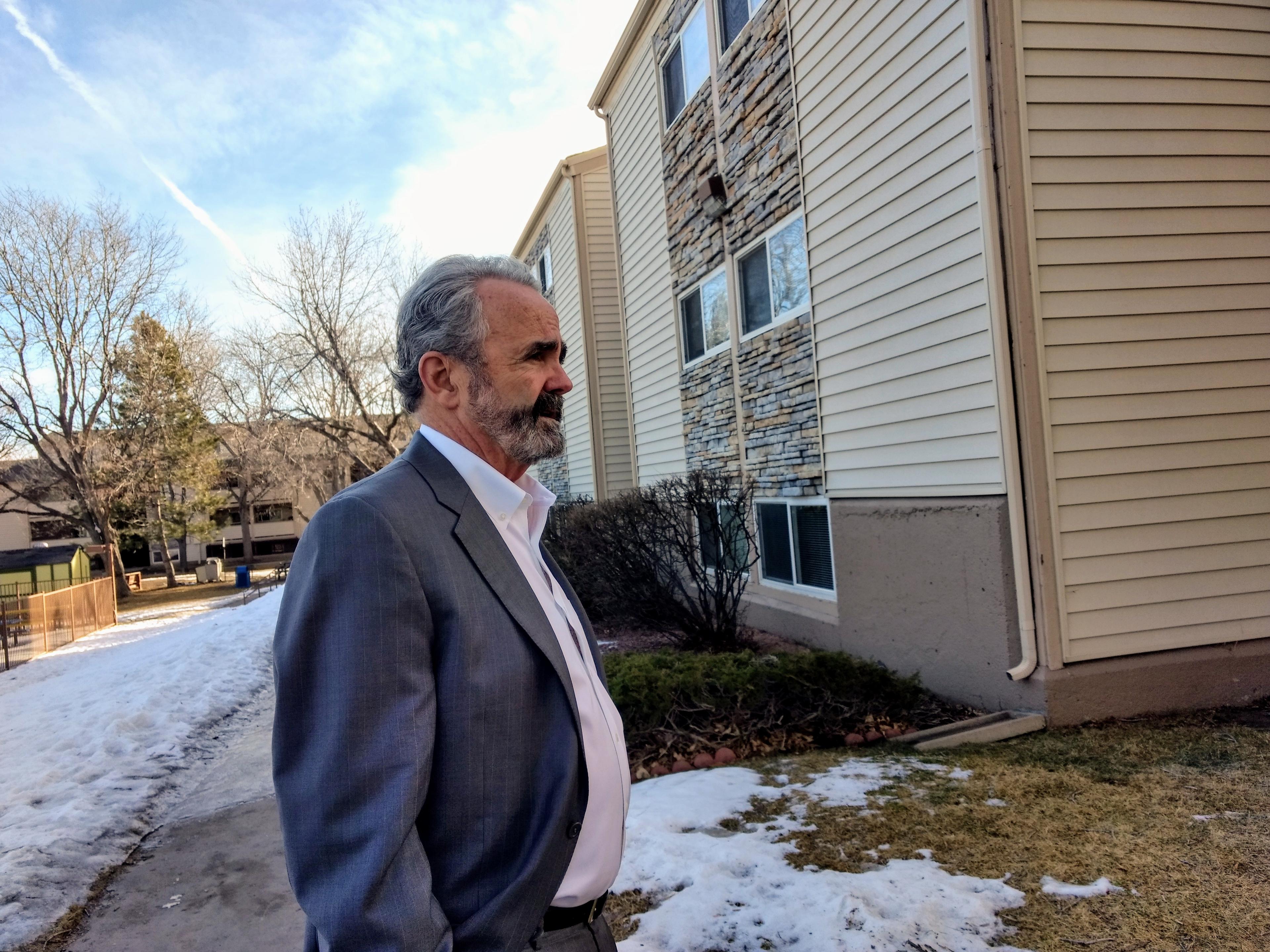A longtime nonprofit provider of housing within reach of low- and moderate-income Denver families has partnered with a national investor in a deal that promises renewal -- but no retreat from a commitment to affordability -- at an East Colfax apartment complex.
As he toured the Garden Court apartments at Syracuse between 11th and 12th this week, Rocky Mountain Communities CEO and President Richard Taft described the complex of 300 units, most of which are rented to tenants who meet income limits, as his nonprofit's flagship. Crews were at work on bathroom and kitchen renovations made possible by the $25 million deal announced late last year with Community Development Trust, a New York-based real estate investor dedicated to creating and preserving affordable housing.
With assistance from the Colorado Housing Finance Authority, CDT bought 90 percent of the complex of 15 low-rise buildings set amid lawns and trees. Taft's RMC retains 10 percent and will continue as manager, which includes providing services such as a preschool, a food pantry and a community garden.
Taft called the infusion of cash RMC's "capital preservation fund."
He set aside $3.5 million for the bathroom and kitchen updates and other renovations that about 175 of Garden Court's units need, as well as to fill a leaky swimming pool that had been expensive to maintain and turn it into a field for soccer and other games. RMC also planned to use funds to operate Garden Court and for overhead expenses, Taft said.
"As we settle in our investments, we'll hopefully keep well abreast of the funding we're taking and actually let it (the sale proceeds) grow," he said.
In about 15 years, Taft said, CDT's share will revert to RMC.
Brian Dowling, CDT's chief investment officer, said his company searches for projects that "make sense economically and accomplish our goals of creating and preserving affordable housing." In addition to taking ownership stakes as it did with Garden Court, CDT also makes loans.
Pat, a Garden Court resident who gave only her first name, said she was worried new ownership and renovations would mean higher rents. She said she had moved to Garden Court about four ago because a rent increase following a change in ownership at another apartment complex had made her home of 20 years unaffordable. That scenario is familiar in the Denver area, where the cost of living has far outpaced many people's earnings.
According to the Colorado Housing Finance Authority, the loan it extended covering 75 percent of the Garden Court deal guarantees that affordability will be maintained for at least 15 years and up to 40 years, depending on the potential life of the loan. Of the 300 Garden Court apartments, 225 of the units will remain as they have been restricted to serve households at or below 50 to 80 percent of the area median income during the affordability period. The others are rented at market rates.
The complex was built in 1972. Taft said it once served as off-base housing for Lowry Air Force Base. The base closed in 1994 and has been redeveloped into a nearby residential neighborhood with shopping and sports and recreational facilities. Garden Court, meanwhile, fell into foreclosure. RMC, formed in April 1992 with an affordable housing mission, purchased the Housing and Urban Development foreclosed property in 1996 for $8.2 million. Taft said that at that time the average Denver metro rent for a two-bedroom was $893 and the average move-in income of a resident was $22,674. He noted that last September, the average Denver rent for a two bedroom unit is $1,725 and the average move-in income of an RMC resident was $33,186.
"We do raise rents from time to time," Taft said.
"The difference between RMC and a market rate housing organization is that they can raise rates to increase profits. RMC increases rents to keep the doors open, maintain our assets and pay our bills as well as employees' wages and benefits. With almost 1,200 low income apartments across Colorado we only employ a staff of between 55 & 60 people."
"We take very seriously the need to keep our rent levels as low as possible," he added. "For those who find that they can't keep up on their rent, managers can offer to help residents create a payment plan to get back on track with on-time rent payments. In addition our program managers have lists of resources for rental and utility assistance that can help those families who need housing assistance."
Garden Court is part of an RMC portfolio of 1,132 units it owns and another 500 it manages, most in the Denver area. Its portfolio includes a joint project that allowed The Delores Project to build a new shelter as well as 35 one-bedroom apartments for people who have experienced homelessness alongside RMC's Arroyo Village, a complex of 95 one-, two- and three-bedroom units for low-income families in west Denver.
Garden Court is the first project in Denver for New York-based CDT. It has been active for 20 years elsewhere, helping to preserve and build more than 45,000 affordable housing units in 43 states. Taft first heard about CDT after the New York company in 2016 worked with the nonprofit Volunteers of America and the Colorado Springs Housing Authority to recapitalize Summit Apartments, a 256-unit mixed-income property in Colorado Springs.
Dowling of CDT said that around the time it was completing the Colorado Springs deal his company hired a Denver-based staffer.
"We had a good experience and it has encouraged us to try to find more ways we can work with the state and other local governments in Colorado," Dowling said. "We are very much looking for additional opportunities in Colorado."













